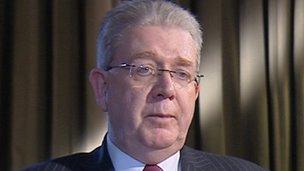Irish passport key to fee waiver in Scotland
- Published

Sixth form pupils from Northern Ireland who want to attend university in Scotland are being told they can qualify for free tuition if they have an Irish passport
A Scottish government spokesman has confirmed that sixth form pupils in the UK who hold Irish passports qualify for free university tuition in Scotland.
Fees are rising to a maximum of £9000 across the UK but in Scotland, pupils who have lived there for at least three years do not have to pay fees.
This is also the case for EU students, as EU law does not allow discrimination against those from other member states.
Irish passport holders in Northern Ireland count as EU students.
Until now it was understood that students from England, Wales and Northern Ireland had to pay the higher fees in Scotland.
But the BBC has been told that those who have Irish passports are exempt. An investigation by BBC Northern Ireland has found that some pupils in Belfast are applying for Irish passports in order to get free tuition in Scotland.
A Scottish government spokesman confirmed that nationality not residence was the key when it came to defining an EU student, and that anyone with an Irish passport living in the UK could apply for free tuition.
Students in Northern Ireland have dual nationality and can opt for Irish passports.
Cathy Moore, chair of the Careers Teachers' Association, said: "The Scottish Parliament has said if you have an Irish passport and live in Northern Ireland and provide that, (Irish passport) you are eligible to have the fees paid."
There is a degree of confusion about how widely this measure applies.

Michael Russell urged NI students to be cautious
It is understood some Scottish universities have told students they will be classed as UK nationals and have to pay fees.
Northern Ireland born, Richard Beggs graduated from Dundee University in 2004. He tried and failed to avail of the alleged exemption: "I knew I was able to get an Irish passport and I thought I would be able to study for free but that wasn't the case.
"They told me because I didn't have an address in the Republic of Ireland over the last three years that I wasn't eligible."
Scottish Education Secretary Michael Russell said universities would have the final word but urged Northern Ireland students to be cautious.
"The purpose of the regulations is to guarantee Scottish students free access. It is not to find ways around for other people. Because of European law, people coming from other jurisdictions do get the same treatment as Scottish students but those in the rest of the UK don't," he said.
Mr Russell agreed the situation was "fluid".
The DUP East Londonderry MP Gregory Campbell said he had raised the issue with Angus Robertson, the SNP leader in Westminster.
"Northern Ireland's citizenship issue is unique to that of the rest of the United Kingdom in that someone living in Belfast can hold both a British passport and an Irish passport. They can officially be an Irish citizen and a British citizen," he said.
"With such a unique situation, the Scottish executive should take an equally unique approach to Northern Ireland students.
"Rather than only those who are happy to have an Irish passport gaining free university places, the Scottish executive should remove all fees for students from Northern Ireland.
"This would restore fairness in that those who wouldn't be comfortable being an Irish citizen can still avail of free places at Scottish universities.
"Those who do not accept being labelled as Irish should not be disadvantaged to the tune of up to £27,000 over a three year period."
Meanwhile, a bonus for Northern Ireland students, is that even if they are classed as EU students and avoid paying tuition fees, they can still get a student loan as a UK citizen.
A spokesperson from Universities Scotland said it was taking advice on the issue but, based on the most recent statistics available, there had not been a rise in applicants holding an Irish passport.
"The regulations for rest of UK fees are based on applicants' ordinary residency rather than nationality and this is the basis on which universities will be processing applications," said the spokesperson.
"Universities continue to liaise closely with the Scottish government and Student Awards Agency Scotland on these regulations in order to ensure the appropriate fee is applied."
- Published30 January 2012
- Published28 December 2011
- Published7 December 2011
- Published8 September 2011
- Published17 August 2011
- Published3 November 2010